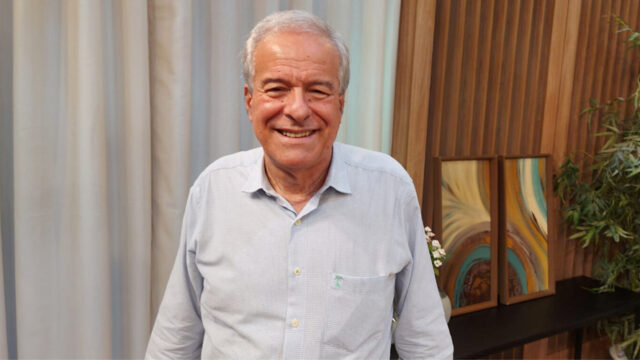“Leaders do what’s right because it is right.”

Pastor Ted Wilson occasionally invites other authors to present pertinent material. This article is adapted from a sermon delivered by Ron Kelly in December 2018 at the Village Seventh-day Adventist Church in Berrien Springs, Michigan, United States. For the full sermon, visit www.villagesda.org/events/kingly-power-sermon-series.
Jewish rabbi and family therapist Edwin Friedman writes in his book A Failure of Nerve “the mind that has not trained itself to the hard disciplines of reasonableness and honesty, will assume, as its devils are cast out . . . to fill itself with their relations.”1
How are you pursuing truth in your life? If you have not disciplined your mind to reasonableness and honesty, you can make anything say anything you want it to say. Especially the Bible. We’re on a journey where God is looking to lead us into all truth; knowing the truth will set us free. But some have not disciplined their minds for reasonableness and honesty.
Well-differentiated
In his book, Friedman describes a “well-differentiated leader” as one who can separate their own emotional being from that of their followers while still remaining connected. Vision, he says, is an emotional rather than cerebral phenomenon, depending more on a leader’s capacity to deal with anxiety than his or her professional training or degree.
Take courage. Here is a leadership consultant and psychologist reminding us that the person best suited to lead is one who can hold up to the emotional duress of occasionally displeasing people. Our history as a church bears this out.
Uriah Smith said of James White, “Some have thought that he was deficient in social qualities and sometimes rigid, harsh, and unjust even toward his best friends. But these feelings . . . come from a failure to comprehend one of the strongest traits in his character—his preeminent love for the cause in which he was engaged.”2
James White was God’s well-differentiated leader, prepared to get this prophetic movement onto solid footing. He and Ellen made tremendous relational and emotional sacrifices to protect and establish the church.
Friedman’s appeal, “From parents to presidents” is that a man or a woman who is not well-differentiated, who doesn’t know who they are and what their duty is, will be a poor excuse as a leader.
Leaders do what’s right because it is right. It’s about moving forward, understanding and caring for the needs of the people you serve.
Kingly Power
The phrase “kingly power” was used by Ellen White many times and in different contexts—sometimes referring to Jewish expectations of the Messiah, the power that Jesus left behind when He came to our world, or Dr. J. H. Kellogg’s grasp for control. In most cases, however, she used the phrase to refer to “the controlling power of one man or a small group of people over the administration of the church. At times she referred to the General Conference president, but more often to the treasurer or to leaders of the medical or publishing work.”3
“Kingly power” is also used to refer to unsanctified humanity and the human desire to be in charge. At times she references the human ability to choose.
This leaves us with numerous references to kingly power in regard to church organization. From small beginnings to rapid expansion, the church had to grow through organizational challenges. Managerial power was centered in two or three people in Battle Creek. But at the 1901 General Conference session this problem was addressed when the church structure was reorganized into unions, which we still have today.
In 1903 Ellen White wrote, “The division of the General Conference into district union conferences was God’s arrangement. In the work of the Lord in these last days, there should be . . . no kingly power.”4 And in that same year she wrote, “All of God’s servants have a work to do in this vineyard. . . . Be very courteous in speech, very kindly in action.”5
Let’s be careful how we throw pejorative phrases around. If someone were to say to you as a manager, or parent, “You’re grasping for kingly power,” it would be an almost impossible accusation to defend against. The phrase has powerful negative emotion attached to it and ought not to be used carelessly or ignorantly, especially in regard to our church leaders.
Power of Prayer
“If there were more prayer in the counsels of those bearing large responsibilities, more humbling of their hearts before God, we should see abundant evidence of divine leadership and greater advancement in our work.”6
Do you sit on a committee? Are you a leader? Is prayer just one of those formalities you hurry and get out of the way so you can work?
“The Lord God of heaven is our leader,” wrote Ellen White. “He is a leader we can safely follow; for He never makes a mistake.”7 This is why prayer matters. “Those who walk in the fear of God, meditating upon His character, will daily become more and more like Christ. Those who choose not to know God will be ostentatious and boastful.”8
As we approach the end, character will reveal those filled with the Spirit from those who are not. God could do the work without us, but He gives us a role to transform us and grow our faith. If we attempt God’s work on our own, we will be ruined in the process.
“There is a great work to be done,” wrote Ellen White in 1904 to church leaders. “My heart aches as I think of the many who are unready to meet their Lord, and the wasted time that has passed into eternity. Oh God, have mercy on Thy people. . . . Grown-up men and women, leaders, are acting like little children. There is not a particle of excuse for the strife and alienation that exists among us.”9
Another time she wrote, “I know how pleased the enemy is when [Satan] can keep the hearts of those in the service of God filled with distrust and suspicion.”10 If you have distrust and suspicion toward a leader, from pastor to conference, union, or division president, or the General Conference president, the first thing to do is to get on your knees and pray!
Any group can become fractured, splintered, divided, but “unity existing among the followers of God is an evidence that the Father sent His Son to save sinners. . . . Nothing short of the miraculous power of God can bring human beings, with their different temperaments, together in harmonious action. . . . Strive earnestly for unity. Pray for it. Work for it. It will bring spiritual help, elevation of thought, nobility, heavenly mindedness. You will overcome selfishness,”11 urged God’s prophet.
God is calling for well-differentiated leaders. Know yourself in Christ and know others in a similar manner. Fulfill the role He has given you and do your best. God will be glorified in the example that you set. “Before the heavenly universe and the church, and the world, you will bear unmistakable evidence that you are God’s sons and daughters.”12
1 Edwin Friedmann, A Failure of Nerve: Leadership in the Age of the Quick Fix, New York: Church Publishing, Inc., 2007 edition, citing Gilbert Murray in Five Stages of Greek Religion, [1925], at www.sacred-texts.com/cla/fsgr/fsgr08.htm, p. 130.
2 Arthur White, Ellen G. White: The lonely years, volume 3, 1876-1891 (Hagerstown, MD: Review & Herald Pub. Assn., 1984), p. 164, quoting Uriah Smith.
3 A. Leroy Moore, “Kingly Power,” in The Ellen G. White Encyclopedia, ed. Denis Fortin and Jerry Moon (Hagerstown, MD: Review and Herald Pub. Assn., 2013), p. 920.
4 Ellen G. White, Testimonies for the Church (Mountain View, Calif.: Pacific Press Pub. Assn., 1948), vol. 8, p. 232.
5 Ellen G. White, Bible Training School, May 1, 1903.
6 Ellen G. White, Manuscript 144, 1903, par. 14.
7 Ibid.
8 Ellen G. White, This Day With God (Washington, D.C.: Review and Herald Pub. Assn., 1979), p. 40.
9 Ellen G. White, Letter 61, 1904.
10 Ellen G. White, Letter 170, 1902.
11 Ibid.
12 Ibid.








